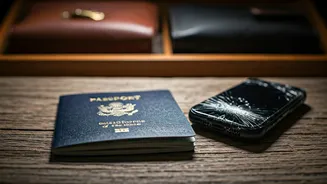Never Damage It
One of the most critical aspects of passport care is preventing physical damage. A passport is more than just a booklet; it's a legal document. Avoid folding,
tearing, or exposing it to moisture or extreme temperatures. Such damage can render a passport invalid or lead to delays at border control. Keeping it in a protective sleeve or passport holder is a simple yet effective precaution. Furthermore, be cautious when using passport scanners, as rough handling can damage the pages or the embedded chip. Always treat your passport with the respect and care it deserves to maintain its integrity.
Avoid Lost/Theft
Losing your passport while traveling can be a nightmare. It's essential to keep it in a secure place at all times, such as a money belt or a secure pocket within your bag. Avoid leaving your passport unattended, especially in crowded places or public transport. Additionally, make copies of your passport's information page and store them separately. These copies can be invaluable if your original passport is lost or stolen, facilitating the process of obtaining a replacement. Report the loss immediately to the local police and your country's embassy or consulate to prevent potential misuse of your document.
Do Not Lend It
Under no circumstances should you lend your passport to anyone. Your passport is your personal identification document, and allowing someone else to use it is illegal and could lead to serious consequences. This also includes allowing someone to use your passport for identification purposes, even if it seems harmless. Such actions could result in passport seizure, fines, or even imprisonment. Remember, your passport is solely for your use, and sharing it could put you and your identity at risk.
Don't Leave It
Never leave your passport unattended in hotel rooms, cars, or other unsecured locations. When you're not actively using it, the passport should be kept in a safe place, such as the hotel's safe deposit box or a secure compartment in your luggage. If you're staying in a hostel or sharing accommodation, be particularly vigilant about safeguarding your passport. Always take precautions against theft or unauthorized access. Regularly check to ensure it’s still in your possession, and if you realize you've left it somewhere, immediately retrace your steps to recover it.
Avoid Unnecessary Stamps
While collecting stamps might seem like a fun travel activity, avoid getting stamps on your passport unnecessarily. Certain types of stamps, like those for novelty purposes or from unofficial sources, could invalidate your passport or cause issues with border control. Stick to official entry and exit stamps issued by the immigration authorities of the countries you visit. Also, refrain from adding stickers or other decorations to your passport, as these can also interfere with its functionality and legitimacy. Maintaining the passport's original condition is crucial for smooth travel.
Never Alter It
Altering your passport in any way is strictly prohibited and can have severe legal consequences. This includes changing any information on the passport page, such as your name, date of birth, or photo. Tampering with a passport is a serious offense that can lead to criminal charges, fines, and even imprisonment. If you need to update your passport information, follow the official procedures established by your country's passport issuing agency. Attempting to modify your passport on your own will be seen as fraud and will result in significant penalties.
No Unauthorized Use
Do not use your passport for any illegal activities or purposes, such as attempting to enter a country under false pretenses or engaging in fraudulent transactions. Using your passport to misrepresent your identity or engage in any unlawful activity can lead to arrest, detention, and deportation. Always ensure that your passport is used solely for its intended purpose: to verify your identity and facilitate international travel. Adhere to all the laws and regulations of the countries you are visiting to avoid potential legal issues.
Don't Ignore Expiry
Keep track of your passport's expiration date. Many countries require that your passport be valid for at least six months beyond your intended stay. Renew your passport well in advance of its expiration date to avoid travel disruptions. Check the validity period before you make any travel arrangements to ensure you won't encounter any unexpected problems at the border. Allowing your passport to expire while traveling could also lead to significant inconvenience, including denied boarding or deportation. Prior planning guarantees smooth passage.

















